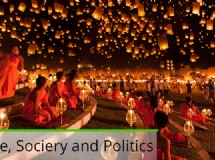The singing lessons we know of today may not be present in the ancient times, but singing has always been part of mankind. According to Otto Jepersen in his 1920 book "Language, Its Nature, Development and Origin," men sang first to communicate emotions before they even learned to speak. We can learn this in singing schools.
The way they sang may not be the same as we do today, but it indicates that humming tunes has been man's first option to communicate with others. As time passes by, men developed different ways to use singing in their daily activities.
Singing in History
From Mesopotamia, Greece, Egypt, and India, singing has always been an integral part of culture and religion. Old texts and scriptures have shown how people used singing as a form of entertainment, communication, and giving glory to God. In the Bible, the Psalms of David and Songs of Solomon are indications how important singing was in men's spiritual life in the ancient times.
However, the advent of singing schools was said to have started in Greece and just spread and developed in different parts of the world. As vocal pedagogy extended in various parts of Europe, the Opera has also developed. The Opera was actually an offshoot of the royals' desire to display their affluence and engage in leisure. Today, Opera is still an important part of musical art and culture.
Around mid 1700's to 1800's, the Opera and music in Europe undertook pertinent changes as changes in the political system also occurred. Composers, singers, and other people engaged in the art of music were greatly affected by changes in their society. Thus Classicism and Romanticism were born in Europe around this time.
During 1920's onwards, music became more accessible to people. Because of the invention of phonographs, people could easily listen to music anytime they want. Before, one needs to learn and buy a piano to provide music in their households.
Learning the Art of Singing
Today, music is very much accessible to anyone, and almost anybody can sing and produce records because of various technologies. Along with this, ordinary people can also get access to stardom by uploading their own recordings on the World Wide Web. But these innovations do not just give everyone the ticket to sing professionally and showcase their skills to everyone.
It is important that one must really have the talent to do so. Therefore, singing schools have been important for parents who dream of their children becoming a famous singer. Kids today even start at very young age just to train and discover their talents early.
Moreover, singing lessons are considered by experts as therapeutic, aside from actually helping a person learn the craft for professional endeavors. Many people, both young and old are keen on discovering their capacity in terms of singing by enrolling in singing classes.
Singing and music has come a long way, and it accompanied men in their journey throughout time. No matter how many changes occurred such as transformation of singing schools and musical entertainment, people will always find new ways to express themselves through their singing voice.
The way they sang may not be the same as we do today, but it indicates that humming tunes has been man's first option to communicate with others. As time passes by, men developed different ways to use singing in their daily activities.
Singing in History
From Mesopotamia, Greece, Egypt, and India, singing has always been an integral part of culture and religion. Old texts and scriptures have shown how people used singing as a form of entertainment, communication, and giving glory to God. In the Bible, the Psalms of David and Songs of Solomon are indications how important singing was in men's spiritual life in the ancient times.
However, the advent of singing schools was said to have started in Greece and just spread and developed in different parts of the world. As vocal pedagogy extended in various parts of Europe, the Opera has also developed. The Opera was actually an offshoot of the royals' desire to display their affluence and engage in leisure. Today, Opera is still an important part of musical art and culture.
Around mid 1700's to 1800's, the Opera and music in Europe undertook pertinent changes as changes in the political system also occurred. Composers, singers, and other people engaged in the art of music were greatly affected by changes in their society. Thus Classicism and Romanticism were born in Europe around this time.
During 1920's onwards, music became more accessible to people. Because of the invention of phonographs, people could easily listen to music anytime they want. Before, one needs to learn and buy a piano to provide music in their households.
Learning the Art of Singing
Today, music is very much accessible to anyone, and almost anybody can sing and produce records because of various technologies. Along with this, ordinary people can also get access to stardom by uploading their own recordings on the World Wide Web. But these innovations do not just give everyone the ticket to sing professionally and showcase their skills to everyone.
It is important that one must really have the talent to do so. Therefore, singing schools have been important for parents who dream of their children becoming a famous singer. Kids today even start at very young age just to train and discover their talents early.
Moreover, singing lessons are considered by experts as therapeutic, aside from actually helping a person learn the craft for professional endeavors. Many people, both young and old are keen on discovering their capacity in terms of singing by enrolling in singing classes.
Singing and music has come a long way, and it accompanied men in their journey throughout time. No matter how many changes occurred such as transformation of singing schools and musical entertainment, people will always find new ways to express themselves through their singing voice.
SHARE






































